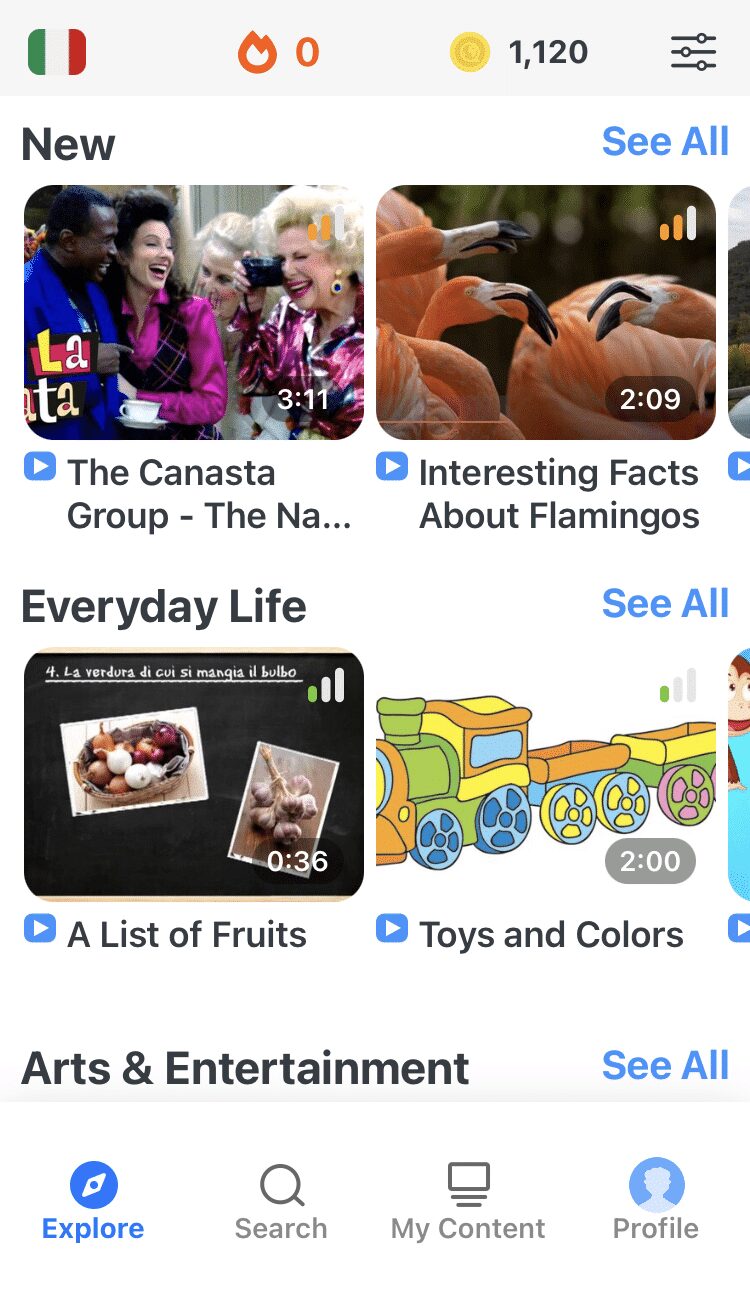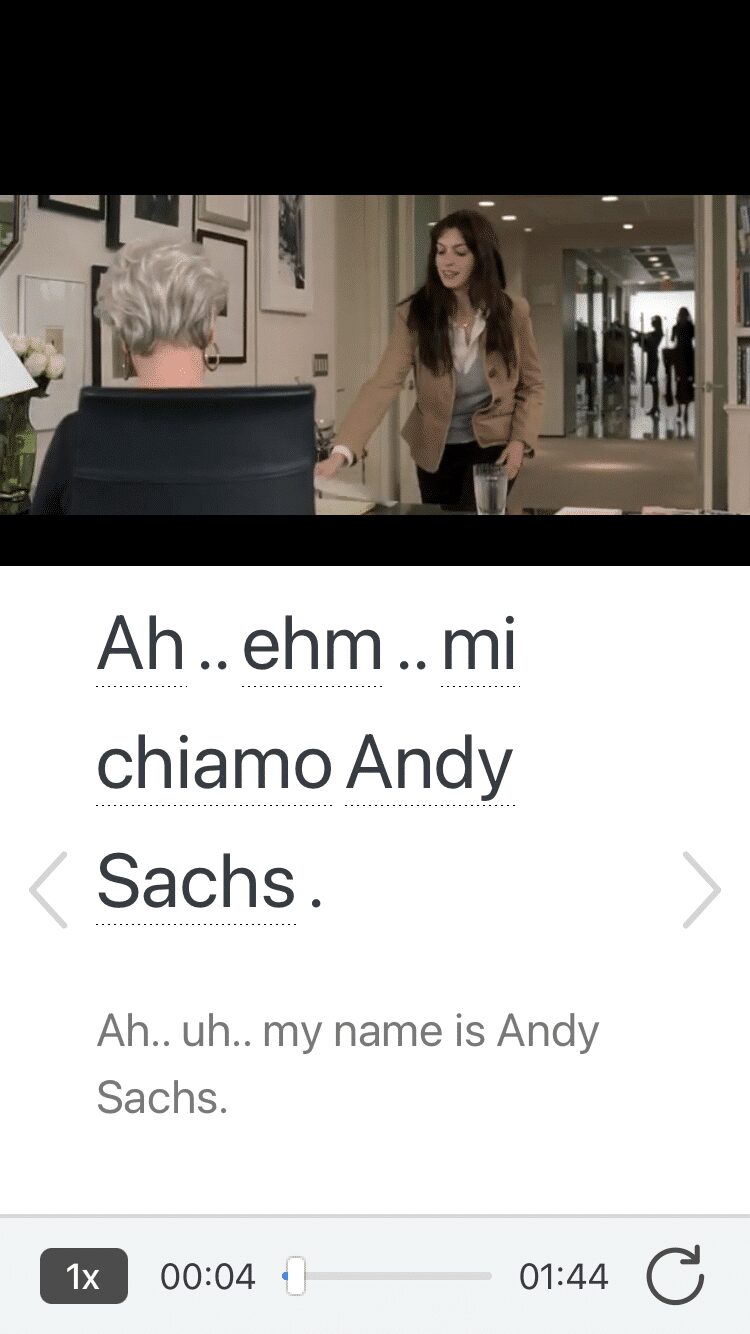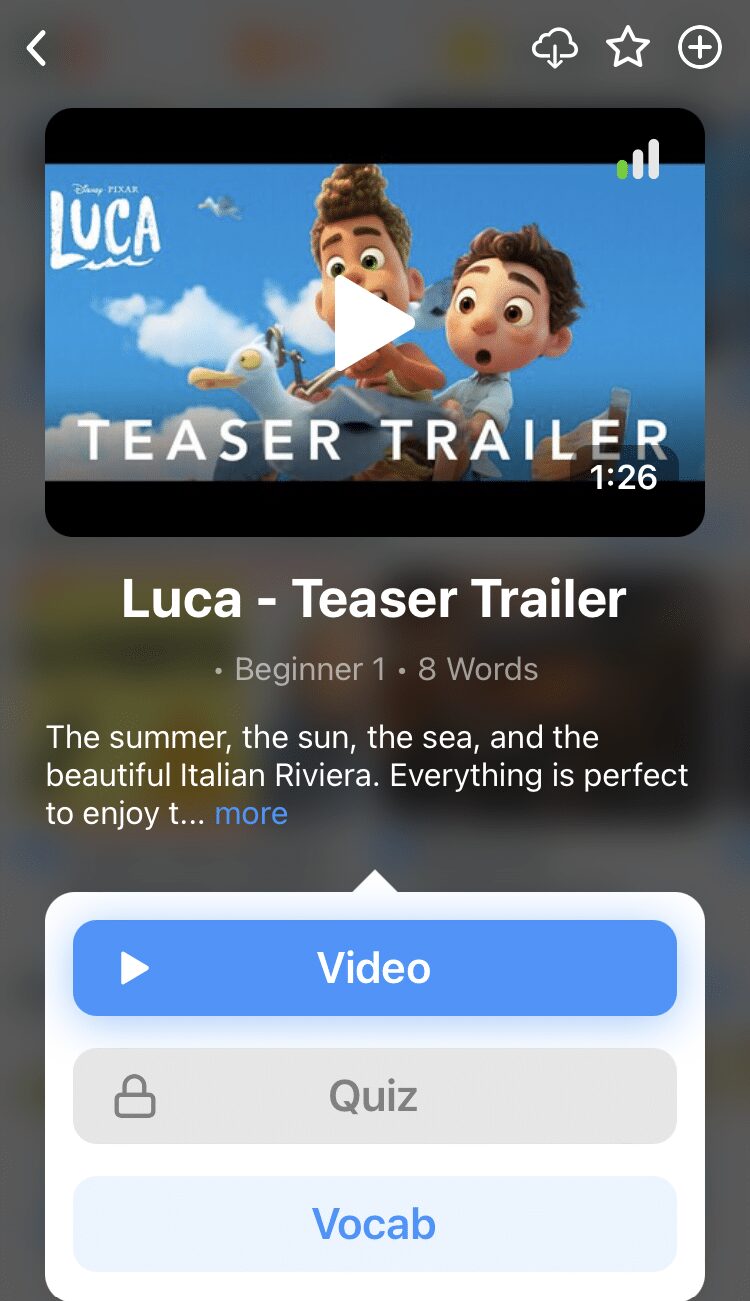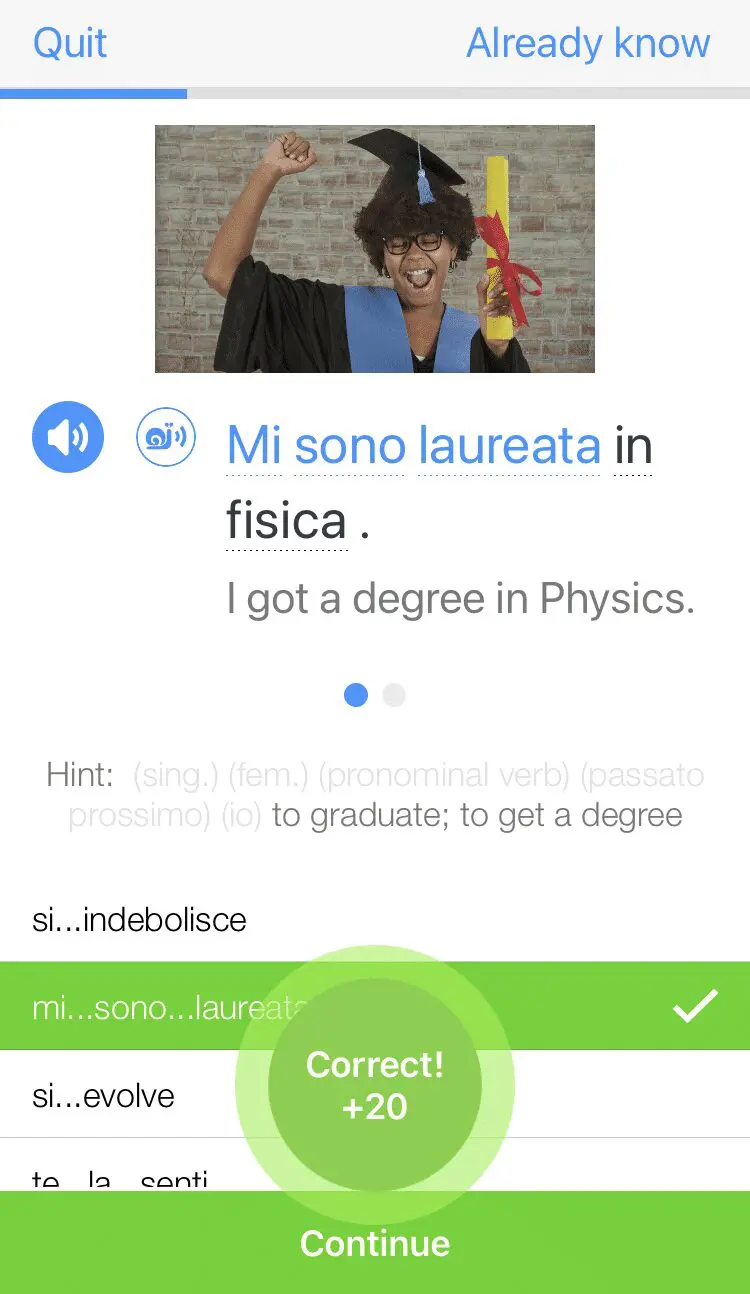140 Most Common Italian Verbs

Verbs are the backbone of a language. They describe actions and states, and without them, nothing moves or does anything.
If you’re learning Italian, you need to learn the most common Italian verbs and their conjugations and uses. Additionally, we’ve included the next most used 120 Italian verbs list, with audio included so you can learn to say them just right.
Download: This blog post is available as a convenient and portable PDF that you can take anywhere. Click here to get a copy. (Download)
15 Common Italian Verbs, Their Conjugations and Uses
These verbs have the strength to turn even the weakest vocabularies into conversational Italian. Under each verb, we’ll tell you if it’s regular or irregular and give you the conjugation in the present tense. The Italian subject pronouns have been left off, because you wouldn’t use them in spoken Italian.
Essere — to be
Irregular
- sono (I am)
- sei (you are)
- è (he/she/it is)
- siamo (we are)
- siete (you [all] are)
- sono (they are)
If you’ve studied any Italian, you’re sure to have come into contact with this verb, but if not, now’s the perfect time to start.
Essere is the original super-verb and is one of the most versatile. Of course you can use it to introduce yourself, but it’s got a lot more potential.
Attach it to any question word and you can find out pretty much anything you want about a particular thing or person. Take a look at who, what, when, where and how:
- Chi è? (Who is it?)
- Cosa è? (What is it?)
- Quando è? (When is it?)
- Dov’è? (Where is it?)
- Com’è? (How is it?)
Note that dove (where) and come (how) drop their final –e when placed next to è.
With essere, you can cover all the basics from meeting new friends to finding your hotel to knowing what time dinner is served. And it doesn’t stop there. Essere is used with all adjectives to describe people, places and things.
Whether you know a bunch of adjectives or just the basics like grande (big), buono (good) and difficile (difficult), all you need is essere to work them into a sentence.
Much like in English, you just start with your noun, then add the verb essere and finally the adjective. Take a look:
La Torta è buona! (The cake is good!)
I corsi sono difficili. (The courses are difficult.)
Stare — to stay
Irregular
- sto (I stay)
- stai (you stay)
- sta (he/she/it stays)
- stiamo (we stay)
- state (you [all] stay)
- stanno (they stay)
We saw the many uses of stare above, so we won’t go into too much detail on this verb. Nevertheless, it has some interesting attributes that are worth mentioning.
Like essere, this verb can also be used to describe a state of being. By contrast, in English, the verb “to stay” is only used to describe your location.
For example, if someone asks, “how are you?” in Italian, they say “come stai?” and not “come sei?” The appropriate response would be “sto bene” (“I’m fine”), not “sono bene.”
Stare and essere are so intertwined that they actually share the same past participles. This means that when you’re speaking in the past, you can use one conjugation for two verbs. Take advantage of this buy-one-get-one deal to give your Italian more power with less studying.
Take a look at the passato prossimo (recent past) conjugations below, which you can use for either verb (note that the spelling of the past participle can change depending on gender or plurality):
- sono stato/a (I was)
- sei stato/a (you were)
- è stato/a (he/she/it was)
- siamo stati/e (we were)
- siete stati/e (you [all] were)
- sono stati/e (they were)
Fare — to do or make
Irregular
- faccio (I do)
- fai (you do)
- fa (he/she/it does)
- facciamo (we do)
- fate (you [all] do)
- fanno (they do)
It would be hard to find a verb more versatile than fare. This verb, which translates as both “make” and “do,” covers almost any physical or creative activity that you could imagine. Here are just a few ways you can use fare to enrich your speaking practice:
Saying what you do for work: Faccio professore d’inglese. (I’m an English teacher.)
Describing mealtimes: Facciamo pranzo alle 13:30. (We’re having lunch at 1:30 p.m.)
Saying what something makes you feel/do (add the pronoun mi [me] before the verb): Quel film mi fa ridere! (That movie makes me laugh!)
Talking about the weather: Fa caldo oggi! Fa bel tempo. (It’s hot today! The weather is great.)
Once you’ve got these down, explore more uses of fare to beef up your vocabulary without having to amass new verbs.
Avere — to have
Irregular
- ho (I have)
- hai (you have)
- ha (he/she/it has)
- abbiamo (we have)
- avete (you [all] have)
- hanno (they have)
Avere is a necessary verb for any vocabulary, because you won’t make it far if you can’t describe possession. But avere is on this list for another reason: it’s an auxiliary verb. Knowing the conjugation of avere will open the doors to forming the past tense in Italian for most verbs.
Let’s look at the past conjugation of the verb fare as an example. To form the past, you simply use the present of avere with the past participle of the main verb (in this case, fare).
Ho fatto i compiti. (I did my homework.)
Hanno fatto i loro letti stamattina. (They made their beds this morning.)
Notice how the form of avere changes, but the form of fare doesn’t? This is because the auxiliary changes and the main verb stays the same. Essentially, this means that once you learn to conjugate avere, you’ll know the past tense of almost all the verbs in Italian! Talk about a shortcut!
Potere — Can, to be able to
Irregular
- posso (I can)
- puoi (you can)
- può (he/she/it can)
- possiamo (we can)
- potete (you [all] can)
- possono (they can)
Potere shares the same root as the word “potent,” meaning powerful, and this verb truly adds a lot of power to your speaking skills.
Potere is an auxiliary verb similar to its English counterpart, “can.” This means that you can use its conjugated form before any other verb in the infinitive (non-conjugated) form to say what you can or can’t do. This can really help stretch a limited vocabulary.
For example, if you want to say, “I’ll wash the dishes,” but you don’t know how to conjugate lavare (to wash), you can say, “Posso lavare i piatti” (“I can wash the dishes”). If you know the conjugation of potere, you can easily get around not knowing how to conjugate other verbs. Even if adding “can” to a phrase makes it sound a bit strange, you’ll still be able to get your point across and communicate effectively.
Volere — to want
Irregular
- voglio (I want)
- vuoi (you want)
- vuole (he/she/it wants)
- vogliamo (we want)
- volete (you [all] want)
- vogliono (they want)
Volere is another auxiliary verb and it functions much like potere. You can use the conjugated form of volere before the infinitive form of any other verb to say what you want or don’t want to do. You can use the same dishwashing example above, replacing posso with voglio to demonstrate how knowing this one verb allows for the easy use of many others.
Here are some other useful tricks volere has up its sleeve:
Saying what something needs: L’albero di Natale vuole una stella! (The Christmas tree needs a star!)
Saying how long something takes (add the pronoun ci [it] before the verb): Ci vuole due minuti in microonde. Ci vuole tre ore per andare a Roma. (It takes two minutes in the microwave. It takes three hours to go to Rome.)
Dovere — must, or to have to
Irregular
- devo (I must)
- devi (you must)
- deve (he/she/it must)
- dobbiamo (we must)
- dovete (you [all] must)
- devono (they must)
Dovere is yet another auxiliary verb and its benefit is similar to those of potere and volere.
An added benefit of learning dovere is that it can also be used to express “should,” albeit in its conditional form. Let’s take a look at the conditional form of dovere.
- dovrei (I should)
- dovresti (you should)
- dovrebbe (he/she/it should)
- dovremmo (we should)
- dovreste (you [all] should)
- dovrebbero (they should)
To express what you should or shouldn’t do in Italian, simply use the above form followed by the infinitive of any other verb. Here’s an example with fare as the main verb:
Dovrei fare i compiti di scuola, ma non ho voglia! (I should do my homework, but I don’t want to!)
Learning the conditional form of dovere won’t just expand your speaking abilities, but it’ll also introduce you to conditional tenses, which will make your life easier when you start studying more complex grammar.
Parlare — to speak
Regular
- parlo (I speak)
- parli (you speak)
- parla (he/she/it speaks)
- parliamo (we speak)
- parlate (you [all] speak)
- parlano (they speak)
Finally, a regular verb! Parlare is one of the first verbs you’ll learn, and it’s one of the most useful. You’ll probably need this verb a lot in the beginning of your Italian journey to help people understand your level of Italian, what language(s) you speak and to ask others to speak slower or more clearly to help you understand.
Parlare is a great verb to learn because you can express some important, speech-related phrases without having to use the more complicated and irregular verb, dire (to say/to tell). Here are some useful phrases to memorize:
Parli inglese? (Do you speak English?)
Non parlo bene in italiano. (I don’t speak Italian well.)
Parli lentamente, per favore. (Speak slowly, please.)
Parliamo in italiano. (Let’s speak Italian.)
Don’t be afraid to use parlare to tell others to change the way they speak. They want you to understand them! And if they keep switching to English, let them know that you want to speak some Italian too.
Vedere — to see
Irregular
- vedo (I see)
- vedi (you see)
- vede (he/she/it sees)
- vediamo (we see)
- vedete (you [all] see)
- vedono (they see)
Once you’re able to express who you are, your abilities, wants and needs, it’s time to start branching out to the world around you. The sensory verb vedere allows you to describe what you see and acts as a stepping stone to more complex sensory verbs.
When describing the world around you, instead of just pointing and saying nouns, use vedo (I see) or vedi (you see) plus a noun to create a complete sentence.
Vedo il castello! Che bello! (I see the castle! How beautiful!)
Vedi il gatto? Mi fa ridere! (Do you see that cat? It’s funny!)
This is a simple way to turn your vocabulary into real Italian in seconds flat.
Sapere — to know
Irregular
- so (I know)
- sai (you know)
- sa (he/she/it knows)
- sappiamo (we know)
- sapete (you [all] know)
- sanno (they know)
As you continue speaking and studying, you’ll need to know how to express what you know and what you don’t. Sapere helps you do that and much more.
The most common phrases, lo so (I know) and non lo so (I don’t know), will get you through many an Italian lesson, but there are more uses of sapere that can help you speak like a native in no time. Try these on for size:
Saying “I think” (with pronoun mi before verb): È andato via Claudio? Mi sa di sì./Mi sa di no. (Did Claudio leave? I think so./I don’t think so.)
Describing what something tastes like: La torta sa di miele. (The cake tastes like honey.)
Saying what you know how to do: So nuotare bene, ma non so parlare francese. (I know how to swim well, but I don’t know how to speak French.)
Sapere is often confused with the verb conoscere (to know). They seem the same, but before you try to use them both, it’s important to get the differences down.
Mangiare — to eat
Regular
- mangio (I eat)
- mangi (you eat)
- mangia (he/she/it eats)
- mangiamo (we eat)
- mangiate (you [all] eat)
- mangiano (they eat)
If you want to have a conversation in Italian but you’re afraid you don’t have the words to do it, just start talking about food. Italians love to talk about food, and they barely go a day without some conversation about gamberi (shrimp), bistecche (steaks) or pasta al forno (lasagna).
These helpful phrases will surely get you an invitation to an Italian dinner table:
Si mangia bene in quel ristorante? (Do you eat well in that restaurant?)
Quale piatti tipici si mangia qua? (What local dishes do you eat here?)
Mangi fuori al fine settimana? (Do you eat out at the weekend?)
Mangiamo insieme presto! (Let’s eat together soon!)
If the conversation ever runs flat in Italian, this is a surefire phrase to bring the mood back up: Dai, mangiamo qualcosa! (Come on, let’s get something to eat!).
Mettere — to put
Irregular
- metto (I put)
- metti (you put)
- mette (he/she/it puts)
- mettiamo (we put)
- mettete (you [all] put)
- mettono (they put)
Knowing how to express “put” is essential to the management of the space around you. Mettere functions much like “put” in English. Metti l’uovo nella pentola translates pretty directly to “put the egg in the pot,” making this an easy verb to use.
Mettere has some other uses that you might find helpful on your Italian journey:
Putting on clothes (with pronoun mi before the verb): Fa freddo fuori! Mi metto la giacca. (It’s cold out! I’ll put on a jacket.)
Bringing something about: È una medicina che mette stanchezza. (That medicine causes fatigue.)
Prendere — to take
Irregular
- prendo (I take)
- prendi (you take)
- prende (he/she/it takes)
- prendiamo (we take)
- prendete (you [all] take)
- prendono (they take)
Prendere translates to a lot of verbs in English, which means you can use it to say a lot of things in Italian. You can use it to mean “take,” but that wouldn’t be taking full advantage of its capabilities. Here are some other fun ways to use prendere:
To pick up: Prendi quella penna! Mi prendi da scuola alle 15:00? (Pick up that pen! Can you pick me up from school at 3 p.m.?)
To take the place of something: Marco prende il posto di Mario nello spettacolo. (Marco is taking Mario’s place in the show.)
To make an appointment: Prendiamo un appuntamento per andare dal medico. (Let’s make an appointment to see the doctor.)
To make decisions: È difficile prendere delle decisioni! (It’s difficult to make decisions!)
And most importantly, you need prendere to enjoy one of Italy’s greatest traditions: coffee! In Italian, you don’t “have” a coffee, you “take” a coffee.
Prendiamo un caffè? (Shall we get a coffee?)
Sentire — to hear or feel
Regular
- sento (I hear)
- senti (you hear)
- sente (he/she/it hears)
- sentiamo (we hear)
- sentite (you [all] hear)
- sentono (they hear)
Sentire is the king of the sensory verbs and literally means “to sense” (although it’s usually used as “to hear”). You’ll first use this verb to talk about what you can hear with your ears, but once you’re comfortable with that, you can start exploring some other ways to express your senses with this versatile verb.
Saying how you feel physically (with pronoun mi before the verb): Non mi sento bene. (I don’t feel well.)
Saying how you feel emotionally (with mi again): Mi sento felice. (I feel happy.)
To taste: Senti la minestra. È buona! (Taste the soup. It’s good!)
To smell something: Sento l’odore di aglio. (I smell garlic.)
Next time you say goodbye in Italian, instead of saying arrivederci (goodbye), try saying ci sentiamo! (talk to you soon!).
Ascoltare — to listen
Regular
- ascolto (I listen)
- ascolti (you listen)
- ascolta (he/she/it listens)
- ascoltiamo (we listen)
- ascoltate (you [all] listen)
- ascoltano (they listen)
Ascoltare is the close friend of sentire, but it’s easier to start with because it’s regular and much more straightforward. Sentire is a great verb for expressing lots of things with little effort, but it can also be tough keeping all its meanings straight. Ascoltare is only used for what you listen to, and as such, it’s an easy sensory verb to nail down.
Try some of these phrases to start some quick conversations or to get someone’s attention.
Che musica ascolti? (What music do you listen to?)
Ascoltami! (Listen to me!)
Ascoltiamo! La professoressa sta parlando! (Listen up! The teacher is talking!)
120 Most Used Italian Verbs
In addition to the common Italian verbs discussed above, here is the next 120 most common Italian verbs list. Learn them and you’ll be golden.
-AR Verbs
| Italian verb | English translation | Example sentence in Italian | English translation of Italian sentence |
|---|---|---|---|
| abitare | to live | Abito in una casa vicino a Roma. | I live in a house close to Rome. |
| aiutare | to help | Giovanna ha aiutato molto con il progetto. | Giovanna helped a lot with the project. |
| amare | to love | Amo passeggiare in montagna con i miei cani. | I love to walk in the mountains with my dogs. |
| andare | to go | Vanno al supermercato ogni venerdí. | They go to the supermarket every Friday. |
| arrivare | to arrive | Mia zia arriverà alle dieci del mattino. | My aunt will arrive at ten in the morning. |
| ascoltare | to listen | Dopo la scuola lei ascolta musica mentre fa i compiti. | She listens to music after school while she does her homework. |
| baciare | to kiss | La mamma bacia la bambina prima di andare a dormire. | The mom kisses the little girl before going to sleep. |
| ballare | to dance | Gli sposi hanno ballato insieme dopo il matrimonio. | The newlyweds danced together after the wedding. |
| camminare | to walk | Cammino ogni giorno per venti minuti per arrivare al lavoro. | I walk twenty minutes every day to arrive at work. |
| cantare | to sing | Il gallo canta tutte le mattine all’alba. | The rooster sings every morning at dawn. |
| cenare | to eat dinner | Cenate con noi stasera? | Are you all eating dinner with us tonight? |
| cercare | to search or to look for | Sto cercando il mio libro di matematica lo hai visto? | I’m looking for my math book, have you seen it? |
| chiamare | to call | Sono Mariella ma tutti mi chiamano Mari. | I am Mariella but everyone calls me Mari. |
| cominciare | to begin or to start | Cominciamo la lezione con un test a sorpresa oggi. | We start the lesson with a pop quiz today. |
| comprare | to buy | Non compriamo i libri online, preferiamo andare in biblioteca. | We don’t buy books online, we prefer to go to the library. |
| consigliare | to suggest or recommend | Non consiglio a nessuno di mangiare in questo ristorante. | I don’t recommend that anyone eat in this restaurant. |
| costare | to cost | Quella gonna non costa molto—comprala! | That skirt doesn’t cost much—buy it! |
| creare | to create | J.R.R. Tolkien ha creato un intero mondo per i suoi libri. | J.R.R. Tolkien created an entire world for his books. |
| cucinare | to cook | Nostra madre cucina la cena per noi ogni sera. | Our mother cooks dinner for us every night. |
| curare | to cure or to heal or to treat | Il medico ha curato le ferite con disinfettante e bende. | The doctor cured the wounds with disinfectant and bandages. |
| dare | to give | Dammi quel telefono ora! | Give me that phone now! |
| diventare | to become | Diventerà una giornalista di grande successo. | She will become a very successful journalist. |
| entrare | to enter | Gli studenti entrano a scuola alle otto del mattino. | The students enter the school at eight in the morning. |
| fumare | to smoke | In Italia non puoi fumare dentro un edificio pubblico. | In Italy you can’t smoke inside a public building. |
| giocare | to play | I gattini giocano dentro una scatola. | The kittens are playing inside a box. |
| guadagnare | to earn | Si è guadagnato la promozione. | He earned the promotion. |
| guardare | to watch | Avete guardato il film ieri sera? | Did you guys watch the film last night? |
| imparare | to learn | È un po’ difficile imparare l’italiano. | It is a bit difficult to learn Italian. |
| incontrare | to meet | Ho incontrato mia moglie per la prima volta all’università. | I met my wife for the first time at the university. |
| iniziare | to start or to initiate | Inizio il mio nuovo lavoro oggi. | I start my new job today. |
| insegnare | to teach | La professoressa insegna letteratura all’università. | The professor teaches literature at the university. |
| invitare | to invite | Non invitare mai un vampiro in casa tua! | Never invite a vampire into your house! |
| lavare | to wash | Lui lava la sua macchina ogni sabato. | He washes his car every Saturday. |
| lavorare | to work | Loro hanno lavorato nella fattoria per trent’anni. | They worked on the farm for thirty years. |
| nuotare | to swim | Lui nuota in piscina ogni mattina alle sette. | He swims in the pool every morning at seven. |
| pagare | to pay | Hai pagato le bollette questo mese? | Did you pay the bills this month? |
| pensare | to think | Pensa alle cose belle non a quelle brutte. | Thanks about the good things, not the bad ones. |
-ER Verbs
| Italian verb | English translation | Example sentence in Italian | English translation of Italian sentence | ||
|---|---|---|---|---|---|
| accendere | to turn on | Accendi le luci per favore.. | Turn on the lights please | ||
| apprendere | to learn | Solo questa mattina ho appreso della sua scomparsa. | Only this morning I learned of his passing. | ||
| assumere | to hire | L’azienda assume cento nuovi dipendenti ogni anno. | The company hires one hundred new employees every year. | ||
| avere | to have | Avete tempo per parlare dopo il lavoro? | Do you all have time to talk after work? | ||
| bere | to drink | Se non bevo abbastanza acqua mi sento male. | If I don’t drink enough water I feel sick. | ||
| cadere | to fall | Il bambino è caduto e si è graffiato il ginocchio. | The little boy fell and scratched his knee. | ||
| chiudere | to close | Chiudi la porta quando entri... fa freddo! | Close the door when you come in.. it's cold! | ||
| conoscere | to know or to meet | Conosci la storia del nostro viaggio a Milano? | Do you know the story of our trip to Milan? | ||
| correre | to run | Lui corre più veloce di me. | He runs faster than me. | ||
| credere | to believe | Non credo più alle favole. | I no longer believe in fairy tales. | ||
| crescere | to grow | Senza sole le piante non crescono. | Without sun plants don’t grow. | ||
| decidere | to decide | A volte è difficile decidere cosa mangiare per cena. | Sometimes it is difficult to decide what to eat for dinner. | ||
| descrivere | to describe | L’autore descrive il paesaggio molto realisticamente. | The author describes the landscape very realistically. | ||
| leggere | to read | Lui ha letto nove libri quest’estate. | He read nine books this summer. | ||
| mettere | to put | Metti la lampada sul tavolo, per favore. | Put the lamp on the table please. | ||
| nascondere | to hide | I gatti si nascondono sempre sotto il letto. | The cats always hide under the bed. | ||
| perdere | to lose | Abbiamo perso la battaglia ma non perderemo la guerra! | We lost the battle but we don't lose the war. | ||
| piangere | to cry | Quella donna piange per ogni cosa—è molto sensibile. | That woman cries over everything—she is very sensitive. | ||
| potere | to be able to | Non posso venire con te al cinema stasera. | I can’t come to the movies with you tonight. | ||
| prendere | to take or to bring | Ha preso un ombrello perché forse pioverà più tardi. | He brought an umbrella because maybe it will rain later. | ||
| promettere | to promise | Prometti che non mi lascerai mai. | Promise you’ll never leave me. | ||
| raggiungere | to reach or to achieve | Finalmente ha raggiunto il suo obbiettivo. | Finally he reached his goal. | ||
| ricevere | to receive | Dopo il Black Friday, riceve sempre tanti pacchi. | After Black Friday, she always receives a lot of packages. | ||
| ridere | to laugh | Quando qualcosa è divertente, ridiamo tantissimo! | When something is funny, we laugh a lot! | ||
| rimanere | to remain | Dopo tutti questi anni rimane fedele. | After all these years he remains faithful. | ||
| ripetere | to repeat | Non ripetere sempre tutto come un pappagallo. | Don’t always repeat everything like a parrot. | ||
| rispondere | to respond | Non rispondere ai messaggi personali durante gli orari di lavoro. | Don’t respond to personal messages during working hours. | ||
| rompere | to break | Il vaso è caduto e si è rotto. | The vase fell and it broke. | ||
| scendere | to go down or descend | Per la rabbia le è salita la pressione. | Because of her rage her blood pressure went up. | ||
| scrivere | to write | Sta scrivendo una biografia. | She is writing a biography. | ||
| sorridere | to smile | Sorridi—sto facendo una foto! | Smile—I’m taking a photo! | ||
| spendere | to spend | Lei non spende molti soldi… preferisce risparmiarli. | She doesn’t spend much money… she prefers to save it. | ||
| temere | to fear | Le piante grasse non temono la siccità. | Succulent plants do not fear the drought. | ||
| vedere | to see | Vedi le stelle nel cielo? | Do you see the stars in the sky? | ||
| vendere | to sell | Hanno venduto tanti libri questo mese. | They sold a lot of books this month. | ||
| vincere | to win | Dopo una partita difficile… abbiamo vinto! | After a difficult game… we won! | ||
| vivere – to live | to live | Vivi con semplicità se puoi. | Live with simplicity if you can. |
-IR Verbs
| Italian verb | English translation | Example sentence in Italian | English translation of Italian sentence |
|---|---|---|---|
| aprire | to open | Apri la porta per tua madre. | Open the door for your mother. |
| avvertire | to warn | Ti avverto… non entrare in quella casa stregata! | I’m warning you… don’t go into that haunted house! |
| bollire | to boil | L’acqua sta bollendo… puoi mettere la pasta. | The water is boiling… you can put in the pasta. |
| capire | to understand | Non capisco niente di questo libro… | I don’t understand anything about this book… |
| colpire | to hit | Un fulmine ha colpito l’albero davanti alla casa. | A lightning bolt hit the tree in front of the house. |
| coprire | to cover | Copri la bambina… ha freddo. | Cover the baby… she’s cold. |
| costruire | to construct or to build | Hanno costruito quella casa in solo due mesi. | They built that house in only two months. |
| cucire | to sew | Mia suocera cuce molto. | My mother-in-law sews a lot. |
| divertire | to have fun or to enjoy oneself | Mi sono divertito alla festa ieri sera. | I had fun at the party last night. |
| dormire | to sleep | Lei dorme fino a mezzogiorno. | She sleeps until noon. |
| finire | to finish | Appena ho finito di pulire la casa il gatto ha rotto il vaso! | As soon as I finished cleaning the house the cat broke a vase! |
| fuggire | to escape, run away or flee | I criminali fuggono dalla scena del crimine. | The criminals flee from the scene of the crime. |
| guarire | to heal | Un braccio rotto non guarisce da un giorno all’altro. | A broken arm doesn’t heal overnight. |
| mentire | to lie | Lui le ha mentito troppe volte. | He had lied to her too many times. |
| morire | to die | Morirò di fame se non mangiamo presto! | I will die of hunger if we don’t eat soon! |
| nutrire | to nourish or feed | Nutriamo i nostri gatti solo con cibi biologici. | We nourish our cats with only organic foods. |
| offrire | to offer | Ti sto offrendo una vita piena di avventure. | I am offering you a life full of adventures. |
| partire | to leave or depart | Parto domani mattina per andare a Londra. | I leave tomorrow to go to London. |
| preferire | to prefer | Lei preferisce le mele… io preferisco le pere. | She prefers apples… I prefer pears. |
| pulire | to clean | Ho pulito tutta la casa in due ore. | I cleaned the whole house in two hours. |
| riempire | to fill | Non riempire troppo il bicchiere. | Don’t fill the glass too much. |
| salire | to go up, ascend or climb | Per la rabbia le è salita la pressione. | Because of her rage her blood pressure went up. |
| scoprire | to discover | Quando leggi scopri tante cose nuove. | When you read you discover many new things. |
| seguire | to follow | Segui quella macchina rossa! | Follow that red car! |
| sentire | to hear or feel | Non ti sento bene… il mio telefono non funziona. | I can’t hear you very well… my phone isn’t working. |
| servire | to serve or be of use | La cameriera serve il secondo adesso. | The waitress is serving the second course now. |
| soffrire | to suffer | Lui soffre di mal di testa. | He suffers from headaches. |
| sparire | to disappear | Il mago è sparito! | The magician disappeared! |
| spedire | to send | Hanno spedito il pacco un mese fa ma non è ancora arrivato. | They sent the package a month ago but it hasn’t arrived yet. |
| suggerire | to suggest | Il libro di cucina suggerisce di non aggiungere sale prima che la zuppa bolla. | The cookbook suggests not adding salt before the soup boils. |
| tossire | to cough | Lui ha tossito per tutto il film, non ho sentito una parola! | He coughed through the whole film, I didn't hear a word! |
| uscire | to go out | Esco con i miei amici stasera alle otto. | I’m going out with my friends tonight at eight. |
| venire | to come | Lei viene per cena ogni domenica. | She comes over for dinner every Sunday. |
| vestire | to dress | Lui si veste solo con abiti di marca. | He dresses only in name-brand clothes. |
How Verbs Work in Italian
Italian verbs take different forms depending on tense and who’s performing the action. Here’s how that works.
Conjugating Regular Verbs
Verbs in Italian change depending on the person and the tense. In regular verbs, the change occurs at the end of the verb, while the beginning, or root, stays the same. As an example, let’s take a look at the regular verb mangiare (to eat) in the present tense:
1st person singular: io mangio (I eat)
2nd person singular: tu mangi (you eat)
3rd person singular: lui/lei mangia (he/she eats)
1st person plural: noi mangiamo (we eat)
2nd person plural: voi mangiate (you [all] eat)
3rd person plural: loro mangiano (they eat)
Notice how each verb ending changes for each person. Luckily, in regular Italian verbs, the same endings are almost always used to denote each person regardless of the verb (in other words, the ending -o denotes the first person singular, the ending -i denotes the second person singular and so on).
This, in turn, renders the pronoun (io, tu, lui/lei, noi, voi, loro — I, you, he/she, we, you, they) unnecessary. You can just use the verb itself to denote the person. For example:
Mangiano al ristorante. (They eat at a restaurant).
The subject pronoun loro (they) has been dropped because the -ano ending of the verb indicates the person.
Now let’s look at how the same verb changes when we switch to a different tense. Below are the different forms of mangiare in the imperfetto (a tense used for continuous/repeated actions in the past).
- 1st person singular: mangiavo (I ate)
- 2nd person singular: mangiavi (you ate)
- 3rd person singular: mangiava (he/she/it ate)
- 1st person plural: mangiavamo (we ate)
- 2nd person plural: mangiavate (you [all] ate)
- 3rd person plural: mangiavano (they ate)
Notice how there are new word endings for each person in this new tense.
Now you’ve got the gist of how regular Italian verbs change depending on person and tense. For a full guide to present-tense regular conjugations, check out this post.
Conjugating Irregular Verbs
Irregular Italian verbs still feature changes at the end of the verb, but the root may change as well. Let’s take a look at the common irregular verb andare (to go) in the present tense:
- 1st person singular: vado (I go)
- 2nd person singular: vai (you go)
- 3rd person singular: va (he/she/it goes)
- 1st person plural: andiamo (we go)
- 2nd person plural: andate (you [all] go)
- 3rd person plural: vanno (they go)
If you want to practice these verbs more, a program like FluentU can help you get started.
FluentU takes authentic videos—like music videos, movie trailers, news and inspiring talks—and turns them into personalized language learning lessons.
You can try FluentU for free for 2 weeks. Check out the website or download the iOS app or Android app.
P.S. Click here to take advantage of our current sale! (Expires at the end of this month.)
But what else can we learn from these verbs? We learn that if you do something right and put the time in, you can succeed faster than you ever thought possible. The only catch is that you have to put the time in, and you have to do it right.
Use the time these verbs save you to make a study schedule and learn a new verb everyday. Before you know it, you won’t need to follow shortcuts anymore. You’ll be the one making them.
Download: This blog post is available as a convenient and portable PDF that you can take anywhere. Click here to get a copy. (Download)
And One More Thing...
If you're as busy as most of us, you don't always have time for lengthy language lessons. The solution? FluentU!
Learn Italian with funny commericals, documentary excerpts and web series, as you can see here:

FluentU helps you get comfortable with everyday Italian by combining all the benefits of complete immersion and native-level conversations with interactive subtitles. Tap on any word to instantly see an image, in-context definition, example sentences and other videos in which the word is used.

Access a complete interactive transcript of every video under the Dialogue tab, and review words and phrases with convenient audio clips under Vocab.

Once you've watched a video, you can use FluentU's quizzes to actively practice all the vocabulary in that video. Swipe left or right to see more examples of the word you’re on.

FluentU will even keep track of all the Italian words you’re learning, and give you extra practice with difficult words. Plus, it'll tell you exactly when it's time for review. Now that's a 100% personalized experience!
The best part? You can try FluentU for free with a trial.
Start using the FluentU website on your computer or tablet or, better yet, download the FluentU app from the iTunes or Google Play store. Click here to take advantage of our current sale! (Expires at the end of this month.)








